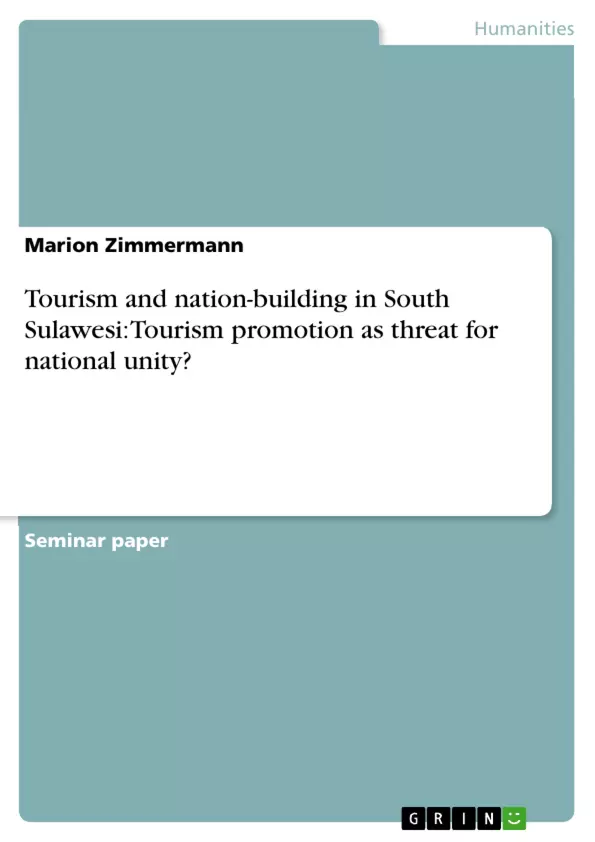In the 1970s the aim of the new Indonesians government was to lead the diverse, multicultural state to a national unity. This was a difficult task for which good ideas were necessary. By promoting tourism the government devised the most successful solution to approximate the aim of unity. Now, the government overlooked the historical ethnic boundaries and cultural and religious differences of some ethnic groups in Indonesia. Therefore some problems arised which must be seen as a threat for the national unity. In this homework I try to show which positive and negative effects the governments efforts had by promoting provincial identities as tourist destinations. I will show mainly the negative results of the governments tourist campaigns with the example of Toraja in South Sulawesi, Indonesia.
Table of Contents
- Introduction
- The unity of Indonesia
- Tourism policy in Indonesia
- Tourism and nation-building in South Sulawesi
- The religious and social relations of two different ethnic groups in South Sulawesi in a short history
- How tourism came to Tana Toraja
- The primadonas of South Sulawesi
- The new reasons of envy by age-old ethnic groups because of promoting special touristic destinations
- Positive and negative experiences with domestic tourism referring to interethnic relations and nation-building
- Conclusions
- Literature
Objectives and Key Themes
The aim of this paper is to explore the impact of tourism promotion on national unity in Indonesia, specifically focusing on the case of South Sulawesi. The paper seeks to understand how the government's efforts to promote tourism in diverse regions have led to both positive and negative effects on interethnic relations and the sense of national identity.
- The role of tourism in achieving national unity in Indonesia.
- The impact of tourism promotion on interethnic relations in South Sulawesi.
- The development of provincial identities as tourist destinations and their potential for fostering or hindering national unity.
- The positive and negative experiences of domestic tourism in relation to nation-building.
- The potential for envy and jealousy between ethnic groups with different cultures when specific provincial sites are promoted as tourist destinations.
Chapter Summaries
- Introduction: This chapter introduces the concept of tourism as a tool for nation-building in Indonesia. It highlights the challenge of uniting a diverse and geographically fragmented nation and introduces the specific focus on South Sulawesi.
- The unity of Indonesia: This chapter examines the historical context of nation-building in Indonesia under the "New Order" regime. It discusses the government's strategies to promote national integration through language, education, economic development, and religion.
- Tourism policy in Indonesia: This chapter explores the development of tourism policy in Indonesia, from its initial focus on economic benefits and international recognition to its later role in promoting national unity. It discusses the government's strategies for promoting domestic and foreign tourism and highlights the potential for both unity and conflict.
- Tourism and nation-building in South Sulawesi: This chapter delves into the specific case of South Sulawesi, examining the impact of tourism promotion on interethnic relations in the region. It discusses the historical and cultural background of different ethnic groups in South Sulawesi and explores how tourism has influenced their interactions.
Keywords
This paper examines the complex relationship between tourism, nation-building, and interethnic relations in Indonesia, specifically focusing on the case of South Sulawesi. Key themes include national unity, tourism promotion, cultural diversity, provincial identity, ethnic rivalry, and the potential for both positive and negative effects of tourism on national integration.
Frequently Asked Questions
How did the Indonesian government use tourism for nation-building?
In the 1970s, the government promoted provincial identities and domestic tourism to foster a sense of national unity among Indonesia's diverse and multicultural population.
What are the negative effects of tourism promotion in Tana Toraja?
Promoting specific ethnic destinations led to envy and jealousy among other ethnic groups, potentially threatening national unity by highlighting cultural and religious differences.
What was the "New Order" regime's strategy for national integration?
The regime used language, education, economic development, and religion as tools to unify the geographically fragmented nation, with tourism being a key component of this strategy.
Why is the case of South Sulawesi significant in this study?
South Sulawesi serves as an example where historical ethnic boundaries and religious differences were overlooked by the central government during tourism campaigns.
Can domestic tourism hinder national unity?
Yes, the paper argues that if tourism policy creates interethnic rivalry or favors certain provincial identities over others, it can become a threat to national cohesion.
- Quote paper
- Marion Zimmermann (Author), 1998, Tourism and nation-building in South Sulawesi: Tourism promotion as threat for national unity?, Munich, GRIN Verlag, https://www.grin.com/document/12977



